Arizona will have added more than 100,000 jobs by the end of the year, with 86,000 of them in metro Phoenix, economist Dennis L. Hoffman told Wednesday’s 59th annual ASU/PNC Bank Economic Forecast Luncheon.
Arizona continues to have a pro-growth economic setting with a competitive tax structure, but declining housing affordability, inflation and interest rate hikes threaten to slow economic expansion, said Hoffman, director of the L. William Seidman Institute, which is part of Arizona State University’s W.P. Carey School of Business.
Although the state is still adding jobs, Hoffman urged those attending the downtown Phoenix luncheon to take steps, such as emphasizing education, to bring more innovators and entrepreneurs to Arizona.
“I would like us to be more cognizant of the fact that young and innovative people can work and live anywhere in this country,” said Hoffman, who also is director of ASU’s Office of the University Economist. “We have to be attractive and welcoming to those folks.”
Hoffman was one of the economic experts who painted a fairly rosy outlook for Arizona against a backdrop of the nation’s slowing economic growth and high inflation.
Christopher Waller, a member of the Federal Reserve’s Board of Governors, said taming inflation remains the Fed’s top goal even if it means imposing short-term economic pain.
“Our goal is to rein in demand, bringing demand and supply in a better balance, which will help reduce upward pressure on inflation,” Waller said at the luncheon, hosted by the W. P. Carey school and sponsored by PNC Bank.
Arizona has done well in national rankings when it comes to the economy. For instance, it ranked fifth in a recent survey by job-resources website CareerCloud when it comes to offering the strongest employment prospects. It trailed Florida, Washington, Delaware and Nevada. The survey also said Arizona offers employers a large and educated workforce.
Hoffman, pointing to census data, said Arizona remains the fourth fastest growing state in population growth and is among the top three destinations for domestic movers. Panelists pointed out Arizona has long touted its relatively low cost of living and has lower minimum wages than some other states.
The state’s minimum wage of $12.80 per hour is scheduled to increase to $13.85 starting Jan. 1.
Housing affordability, however, has declined because of rising home prices. Phoenix-area home prices are forecasted to increase 1.7% in the 12 months starting in September, according to the most current S&P CoreLogic Case-Shiller Index.
“Housing is considerably less affordable here in Arizona than it was five years ago,” Hoffman said, adding that it’s especially hard on millennials and other younger home buyers.

